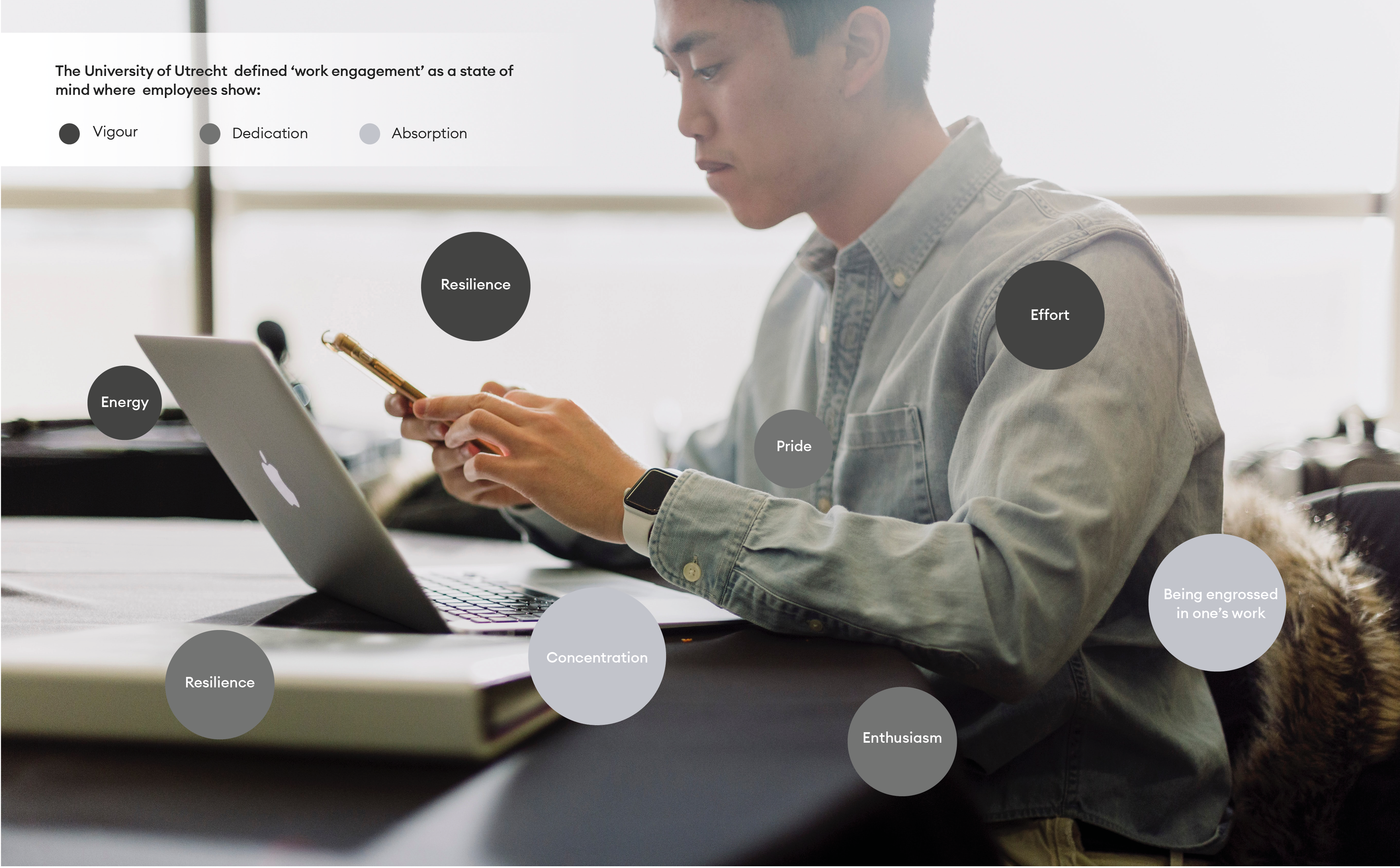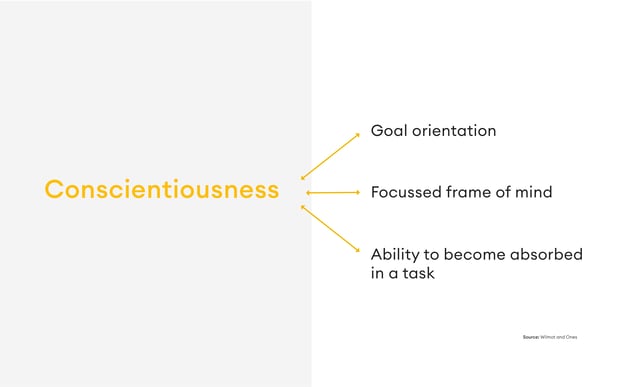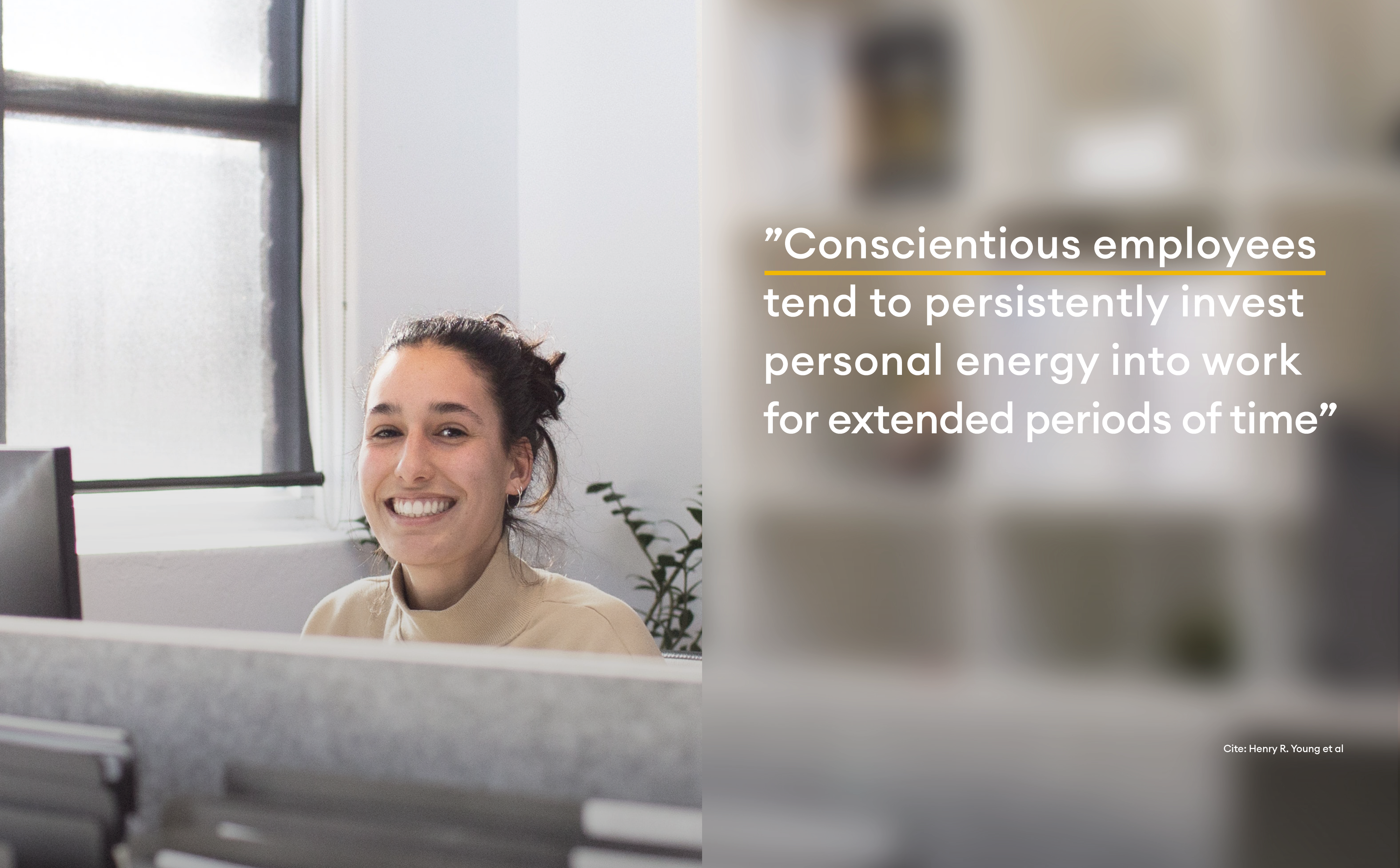But is there another way to think about employee engagement? As recruiters, can we shift our lens from a point of view that concentrates on less helpful metrics such as years of years experience or where people have previously worked? And when we think about employee retention, how about expanding our focus from engagement schemes, employer branding and office dogs, to understanding which personality traits make a person more likely to be engaged from day one?
What is employee engagement?
Let’s track back and define “employee engagement”. The CIPD finds the best definition to be from the definitive research undertaken by the Utrecht University group of occupational psychologists. They defined ‘work engagement’ as a state of mind in which, rather than being burnt out, employees show:
- Vigour (energy, resilience and effort)
- Dedication (for example, enthusiasm, inspiration and pride)
- Absorption (concentration and being engrossed in one’s work)

Why does employee engagement matter?
On a human level, employee engagement matters because we would all like to be working in a field where our effort is valued, our pride is recognised and, when we check the time we find that hours have gone by and we have created something of value. Aside from the pay check, that’s why we work - to create something of value.
Organisationally speaking, employee engagement matters: employees who are more engaged are 2.9 times more productive than others. So an engaged employee is a productive employee. Win win - right?
However, so far, the attention that engagement gets is mostly focused on what the organisation needs to do to spark engagement in their employees. Less attention has been paid to the fact that certain employees actually tend to be more engaged regardless of the role or context they enter into. And there is substantial evidence to back this up.
What is the evidence around engagement and personality?
A wide-reaching meta-analysis from researchers Michael P. Wilmot and Deniz S. Ones took a bird’s eye view of the field, analysing 92 unique studies which represent more than 1.1 million participants across over 2,500 studies.
Wilmot and Ones found that, after around 100 years of research by academics into what comprises a helpful employee, that “conscientiousness is the most potent noncognitive construct for occupational performance”. Simply put: after General Mental Ability, being conscientious is one of the strongest predictors for who is going to succeed at work.
Is there a link between conscientiousness and employability?
Wilmot and Ones break the idea down further: conscientiousness “refers to individual differences in the tendency to be hardworking, orderly, responsible to others, self-controlled, and rule abiding”. This isn’t a case of ‘scientists prove night follows day’; Wilmot and Ones are making sure that the links between employability and conscientiousness are real, not a coincidence.
It’s not just as simple as ‘a conscientious person is going to be a good employee’.
Wilmot and Ones find strong links between conscientiousness and these tendencies:
- goal orientation
- focussed frame of mind
- ability to become absorbed in a task

What does this remind you of? Someone who is engaged in the task at hand. Someone who can work to a goal with focus and absorption. An engaged employee.
Why can being a little boring make for a great leader?
Wilmot and Ones also find a link with conscientiousness and a preference for predictable environments; so people who are higher on conscientiousness are more likely to welcome the routine of a day job (rather than personality types who might be better suited to the higher variability of freelancing).
Conscientiousness also points to a shared responsibility for shared goals, thus pointing to candidates who are more likely to help their coworkers, be an effective teamworker, and emerge as a leader who can take a team to success.
Within these themes, we can see a high correlation - that is, a strong connection - of conscientiousness and someone who is more temperamentally likely to be an engaged employee.
Does looking for meaning increase engagement?
Another meta-analysis in the Journal of Organizational Behavior took a slightly different view; their meta-analysis looked at 114 samples, comprising 44,224 people. Again, by analysing this many results, researchers are able to look at a very broad sweep of data, with a lot of detail and depth.
The team, headed by Henry R. Young of Michigan State University, found that people who are conscientious are also more likely to be proactive, have a positive affect (put simply - they seem to be happy) and follow through with their tasks.
people who are conscientious are also more likely to be proactive, have a positive affect and be diligent.
They say “employees high on conscientiousness will be more apt to invest energy into work through their increased sense of obligation and achievement striving … for example, conscientious employees tend to persistently invest personal energy into work for extended periods of time”.
Again we return to looking at traits: people who can
- get absorbed in a task
- invest their energy
- see the potential for the creation of something meaningful

Why do the studies show similar and different findings?
These two wide-ranging meta-analyses found slightly different priorities. That’s one of the most exciting things about science! What unifies the meta-analyses is a deep insight that conscientiousness is one of the most important personality traits that we can and should hire for.
Hire for engaged employees - today
A good employer needs to invest proactively in engagement strategies that resonate with the mission and values of the organisation; from helping employees to achieve strategic qualifications, to recognising effort and remembering birthdays, validating individuals will remind people why they joined you, and help them to stay.
How do make this easier and more likely to succeed? By hiring people who are conscientious, whose personalities make them more likely to get absorbed in the task at hand, to want to grow their skills and invest their energy wisely so that the job gets done.
But in addition, thinking about how to discover more about the personalities of candidates will help you to create a deeper sense of cultural fit than surface level indicators such as past employers, universities or even if your name feels familiar.
We can’t find a perfect employee; that doesn’t exist. But we can focus our lens on the person who is most likely to enjoy that birthday cake and push on through to get their team, and you, over the line.







